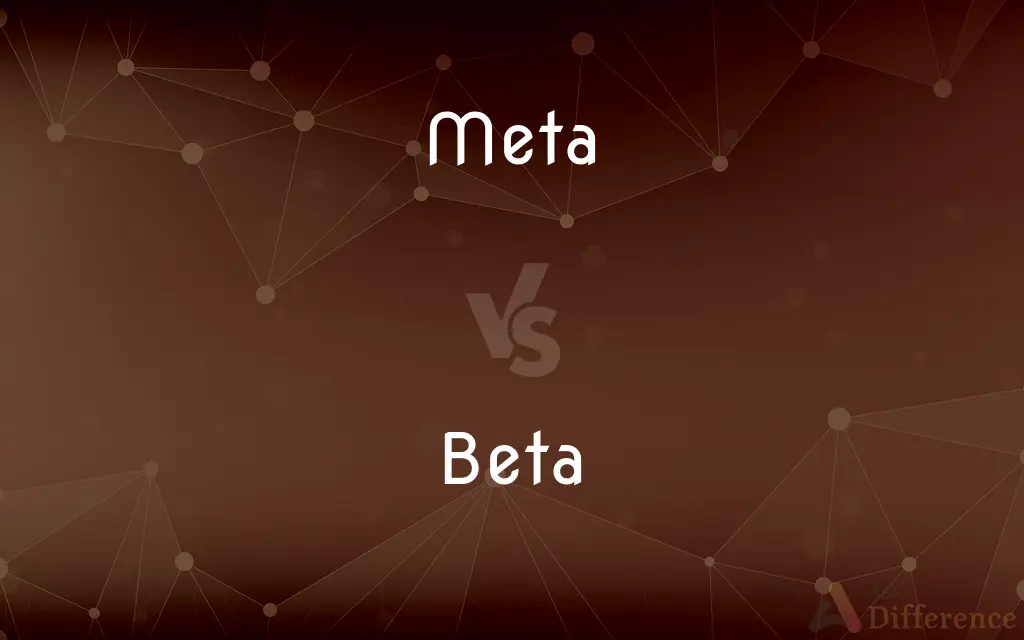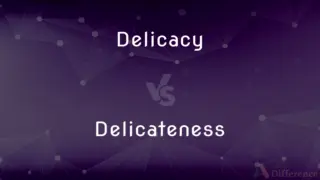Meta vs. Beta — What's the Difference?
By Tayyaba Rehman & Urooj Arif — Updated on February 22, 2024
Meta refers to a concept that is an abstraction from another concept, used to analyze the original concept's properties. Beta denotes a testing phase for software, products, or services before their final release, focuses on identifying and fixing issues.

Difference Between Meta and Beta
Table of Contents
ADVERTISEMENT
Key Differences
Meta and beta serve distinct purposes in their respective contexts. Meta is often used to describe a level of abstraction that goes beyond the basic subject matter, concept, or idea. In various fields, such as philosophy, art, and digital media, "meta" implies self-reference or a higher level of analysis. For example, a meta-analysis involves analyzing data from multiple studies, and in digital culture, "meta" might refer to content that self-referentially comments on its own nature or medium.
Beta, on the other hand, is a term widely used in the software industry and product development to denote a phase of testing that occurs after the initial development (alpha phase) but before the final release.
During the beta phase, software, products, or services are released to a limited audience outside the development team to uncover bugs or issues that were not previously identified. This phase is crucial for improving product quality and user experience based on real-world feedback.
"Meta" deals with abstraction and self-reference, whereas "beta" is concerned with the practical aspects of testing and refining products or services. Understanding the difference between these terms is essential for correctly interpreting discussions in various fields, from software development to cultural studies.
Comparison Chart
Definition
An abstraction from another concept, often used to discuss or analyze the original concept's properties.
A testing phase for products, software, or services before their final release.
ADVERTISEMENT
Context
Philosophy, art, digital media, and analysis.
Software development, product design, and user testing.
Purpose
To provide a higher level of analysis or self-reference.
To identify and fix issues, ensuring the product is ready for public release.
Examples
Meta-analysis, meta-discussion, meta-joke.
Beta version of software, beta test of a new service.
Outcome
Enhanced understanding or commentary on the subject.
Improved product quality and user experience based on feedback.
Compare with Definitions
Meta
Self-referential.
The movie's meta-humor jokes about the film industry.
Beta
Testing phase before final release.
The app is currently in beta testing to find bugs.
Meta
Analysis of analyses.
A meta-analysis combines results from multiple studies.
Beta
User feedback stage.
The company is collecting user feedback during the beta phase.
Meta
Beyond or about itself.
A meta-commentary discusses the nature of commentary itself.
Beta
Second phase of development.
After successful alpha testing, the project moved into beta.
Meta
Higher level of abstraction.
Meta-ethics explores the nature of moral judgments.
Beta
Pre-release version of software.
I'm using the beta version of this software, so there might be some issues.
Meta
Within digital culture, referring to content about content.
That social media post was so meta, discussing the platform's impact on communication.
Beta
Limited release for testing.
The beta release of the game is available to select users for early feedback.
Meta
Making or showing awareness of reference to oneself or to the activity that is taking place, especially in an ironic or comic way.
Beta
(computing) Preliminary; prerelease. Refers to an incomplete version of a product released for initial testing.
Meta
Meta (from the Greek μετα-, meta-, meaning "after" or "beyond") is a prefix meaning more comprehensive or transcending.
Beta
Preliminary or testing stage of a software or hardware product.
A beta version.
Beta software.
Common Curiosities
Why is the beta phase important in software development?
The beta phase is crucial for uncovering bugs or issues not found during initial development, ensuring the software is functional and user-friendly at launch.
Can a product be both "meta" and "beta"?
Yes, in theory, a product could be described as "meta" if it involves self-reference or abstraction, and "beta" if it's in the testing phase, although these aspects address different characteristics.
What does "meta" mean?
"Meta" means an abstraction from another concept, used to analyze, discuss, or refer to the original concept's nature or properties.
How does "meta" apply to art and culture?
In art and culture, "meta" often refers to works that self-referentially comment on their own medium, techniques, or the nature of artistic expression itself.
What differentiates a beta version from a final release?
A beta version is a pre-release version that may contain bugs and is subject to change based on feedback, whereas a final release is considered complete and stable.
What is a "beta" phase?
The beta phase is a period of testing for software, products, or services before their final release, aimed at identifying and fixing issues.
Can anyone participate in beta testing?
Participation in beta testing varies; some tests are open to the public, while others are limited to a selected group of users.
Is "meta" always related to digital media?
While commonly associated with digital media, "meta" applies broadly to any context where concepts refer to themselves or operate at a higher level of abstraction.
How do companies benefit from beta testing?
Companies benefit from beta testing by gaining valuable feedback from real users, which helps improve product quality and user satisfaction before the final release.
Can a discussion be considered "meta"?
Yes, a discussion can be considered "meta" if it analyzes or comments on the nature of discussions themselves, rather than focusing solely on the original topic.
Share Your Discovery

Previous Comparison
Marsupial vs. Rodent
Next Comparison
Delicacy vs. DelicatenessAuthor Spotlight
Written by
Tayyaba RehmanTayyaba Rehman is a distinguished writer, currently serving as a primary contributor to askdifference.com. As a researcher in semantics and etymology, Tayyaba's passion for the complexity of languages and their distinctions has found a perfect home on the platform. Tayyaba delves into the intricacies of language, distinguishing between commonly confused words and phrases, thereby providing clarity for readers worldwide.
Co-written by
Urooj ArifUrooj is a skilled content writer at Ask Difference, known for her exceptional ability to simplify complex topics into engaging and informative content. With a passion for research and a flair for clear, concise writing, she consistently delivers articles that resonate with our diverse audience.
















































